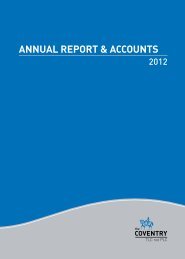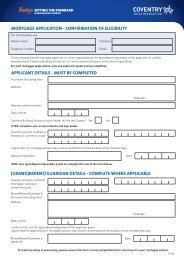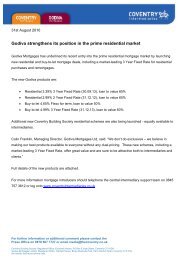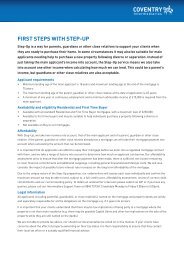Annual report and accounts 2009 (PDF) - Coventry Building Society
Annual report and accounts 2009 (PDF) - Coventry Building Society
Annual report and accounts 2009 (PDF) - Coventry Building Society
You also want an ePaper? Increase the reach of your titles
YUMPU automatically turns print PDFs into web optimized ePapers that Google loves.
DIRECTORS’ REPORTBUSINESS OBJECTIVES AND ACTIVITIESThe <strong>Society</strong>’s principal objective is the provision of a range ofpersonal financial services including mortgage finance forhouse purchase <strong>and</strong> improvements, savings, investment<strong>accounts</strong> <strong>and</strong> insurance.The directors consider that no activities carried out during theyear were outside the powers of the <strong>Society</strong>.BUSINESS REVIEWThe <strong>Society</strong> performed strongly in <strong>2009</strong>, achieving excellentresults for a mortgage lender in difficult economic conditions.This success was based on strong fundamentals of securefunding, the ability to attract <strong>and</strong> retain retail savings,continued operational efficiency <strong>and</strong> strong asset quality. Thisunderlying strength enabled the <strong>Society</strong> to continue lending<strong>and</strong> in doing so achieve record mortgage market share,affirming the board’s belief that the <strong>Society</strong> has the rightbusiness model for these difficult conditions.External environmentThe financial crisis <strong>and</strong> resulting worldwide economicrecession continued to define the market environment in<strong>2009</strong>, damaging confidence <strong>and</strong> creating pressure on theoperating models of all financial organisations.At the start of the year, the UK housing market facedparticular pressures. A shortage of mortgage availability,with many lenders unable to fund their usual level of newloans, combined with the impact of the recession, broughtabout falling house prices <strong>and</strong> sales.The Government, faced with the twin imperatives of stabilisingthe financial sector, <strong>and</strong> in particular those failing banksdeemed systemically important, <strong>and</strong> lessening the impact ofthe recession, intervened on an unprecedented scale. Thesums of public money deployed to support the financialsystem resulted in a level of national debt that is likely to be akey influencer of economic policy for many years to come.The support for Royal Bank of Scotl<strong>and</strong> <strong>and</strong> Lloyds BankingGroup involved a substantial investment of public funds <strong>and</strong>have, together with ongoing responsibilities for Northern Rock<strong>and</strong> the lending arm of Bradford & Bingley, taken significantelements of the UK banking sector effectively into publicownership.Confidence in UK financial services, once seen as a worldleadingindustry, has been severely damaged <strong>and</strong> the longterm impact of regulatory attempts to prevent a potentialrecurrence are yet to be understood.The Government’s actions to reduce the impact of therecession appear to have been effective in the short term butat a cost to the public finances which may define the economyfor many years. The Bank of Engl<strong>and</strong> Base Rate hasremained at an historically low 0.5% since March <strong>2009</strong> <strong>and</strong>this attempt to stimulate spending was backed by aQuantitative Easing programme of £200 billion as the Bankattempted to improve liquidity across the market.Monetary measures were backed by fiscal policies includingthe temporary reduction of VAT to 15% <strong>and</strong> specific action toprotect a housing market that at the start of the year wasshowing significant reductions in house values <strong>and</strong> overallmarket volumes.Collectively these measures appear to have helped prevent acollapse of the housing market. Prices rose in the secondhalf of the year, though the lack of volume indicated that ashortage of supply was a major factor in this. Repossessionsin the industry were also less than initially expected as the lowinterest rate environment <strong>and</strong> proactive approach taken bymost lenders enabled more people to remain in their homes.Nevertheless, the board believes the outlook for the economyin general, <strong>and</strong> house prices in particular, remains uncertain.The lack of volume in the housing market was also a result ofthe reduction in the capability of many lenders to fundmortgages. The wholesale funding market remainedrestricted <strong>and</strong> as a consequence the retail savings marketwas very competitive <strong>and</strong> the relative cost of retail funds wasexpensive.The difficult market conditions exposed weaknesses withinthe building society sector too. <strong>2009</strong> was marked by thefailure of Dunfermline, the merger of Yorkshire <strong>and</strong> Chelseabuilding societies <strong>and</strong> the introduction of a new debt for equityscheme to recapitalise West Bromwich <strong>Building</strong> <strong>Society</strong>. Thelatter raised particular questions about the dilution ofmutuality amongst building societies <strong>and</strong>, overall, the futureof the sector was questioned more during <strong>2009</strong> than at anytime during the financial crisis. Credit ratings were reducedwith some building societies being marked down significantly.Impact on <strong>Coventry</strong> <strong>Building</strong> <strong>Society</strong>Despite the difficult market, the <strong>Society</strong> performed verystrongly, based on the consistent application of a simpletraditional building society model of attracting <strong>and</strong> retainingnew savings balances to support responsible lending.The <strong>Society</strong>’s strength is its ability to maintain this traditionalapproach without recourse to new or increased levels of risk.This has meant that the <strong>Society</strong> has avoided the pitfallsexperienced by some competitors which have restricted theirability to lend.9
















